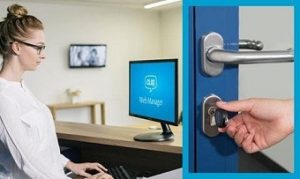
The stakes are higher when it comes to hospital security, yet a hospital building or complex must remain a welcoming and supportive space, around the clock. Mechanical lock and key technology may be too passive for today’s modern healthcare environment, and the familiarity of keys does not need to be abandoned altogether, rather it can be upgraded to become a smarter solution entirely.
Programmable electronic key systems put the advantages and flexibility of sophisticated access control into the form of a traditional key. Lost keys and departed employees are no longer a problem, because their key’s access rights can be cancelled with a click. And at multiple secure points around the hospital, the familiarity of a key is welcome to the users.
Keys can be as smart as a card-based credential. For example, Cliq technology from Assa Abloy backs up the familiarity and ease of use of key-based locking with the flexible management and real-time security features of an intelligent electronic access system.
For hospitals Cliq can be invaluable in managing access to medicines and other controlled substances. Nursing staff using older mechanical key systems struggle to keep track of who has the right keys. Searching for that person to gain access to drugs wastes precious time.
At Queen Elizabeth Hospital, Birmingham, pharmacy managers sought a better solution adapted to nurse-accessed medicine stores. They chose a Protec2 Cliq system which combines mechanical disc cylinders with battery powered, programmable Cliq keys. Lock electronics are powered by the battery inside every key, so the retrofit was cable-free. Cliq devices secure doors, cabinets and mobile drug trolleys within the same access system.
Security and pharmacy managers can see who opened every lock whenever they want — making medicine audits and incident investigation much easier. “Programmable key solutions can really boost medicine safety in hospitals,” says Stephan Schulz, Cliq Product Manager at Assa Abloy Opening Solutions EMEA. “Nurses at Queen Elizabeth, Birmingham, carry their own key with personalised access rights, so they don’t waste time finding out who has the key to every cupboard. Patients benefit.”
“A similar system trialled at Scunthorpe Hospital found the total wasted time eliminated would equate to having an additional 24 nurses on duty across the Trust every day,” Stephan Schulz adds. Key-based access solutions are equally comfortable at scale. At University Hospital, Frankfurt 1,100 Ecliq cylinders secure doors in a new building. A fully electronic implementation of Cliq technology, E-CLIQ cylinders and keys are easy for staff to use and for hospital security managers to administer from web-based software.
The CLIQ Web Manager makes it easy to program, reprogram and audit every CLIQ key, cylinder or padlock. The interface is accessible from anywhere with an internet connection so the system can be managed at any time from anywhere. Its architecture supports multiple administrators or sites. The Web Manager also integrates easily with all kinds of business management software, helping to automate tedious operations and processes. The Web Manager can become one element within an existing access control system, if required.
The Web Manager can run in a self-hosted IT environment or completely free of local software installation with two different Software as a Service (SaaS) solutions: Shared SaaS or Dedicated SaaS with dedicated hosting and customised maintenance schedules. With either option, the security software is always up-to-date — a major benefit in healthcare, where confidentiality makes cyber-attack resistance critical.











